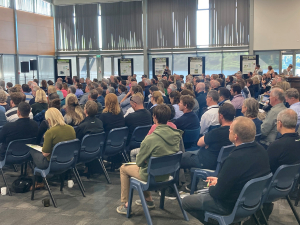Is augmented reality the future of farming?
Imagine a farmer being able to tell a paddock’s pasture cover and dry matter content just by looking at it, or accessing information about a cow’s body condition score in the same way.
 Farmers at the DairyNZ Farmers' Forum in Cambridge heard from Melissa Clarke-Reynolds and DairyNZ chair Jim van der Poel.
Farmers at the DairyNZ Farmers' Forum in Cambridge heard from Melissa Clarke-Reynolds and DairyNZ chair Jim van der Poel.
Dairy customers around the world are demanding transparency, wanting to know about the sector's products and services, and what it is doing to reduce greenhouse gas emissions, says foresight practitioner and strategist Melissa Clarke-Reynolds.
Addressing dairy farmers at a recent DairyNZ Farmers' Forum in Cambridge, Clarke-Reynolds highlighted her optimism in dairy being able to position well, while responding to the changing farming landscape. She also spoke last week at the Canterbury Farmers' Forum.
"We are coming into a time of turbulence, where we are under pressure to reduce our emissions. Part of this challenge is looking at what premiums we can add to milk, to gain a higher price and provide what the customer is asking for," she says.
"Our farmers produce artisan milk at volume. This is milk that is from grass-fed cows, in the open country, and produced by farmers that care for their animals, people, communities and country.
"We need to make these benefits and 'natural-ness' at the forefront of our products, in a world where milk will be made cheaper and better by technology in the future.
"Dairy is the backbone to our economy, and we produce milk well. But now is the time to prepare for the disruption that is coming in the next 10 years and consider how you will shift to differentiate your individual businesses."
DairyNZ chairman Jim van der Poel also emphasised that New Zealand continues to contribute significantly to the economy, generating $22 billion in export earnings in the 2021/22 season.
"Our dairy products today are highly valued by our global customers. They know them to be safe, of high quality and produced to a high standard," Jim says.
"This was no fluke. New Zealand dairy farmers are some of the most innovative in the world. We have always had challenges, but over the years a combination of farmer innovation and science has driven us forward and will continue to help as we face difficult challenges."
One of New Zealand’s longest-running pasture growth monitoring projects will continue, even as its long-time champion steps away after more than five decades of involvement.
The Insurance & Financial Services Ombudsmen Scheme (IFSO Scheme) is advising consumers to prepare for delays as insurers respond to a high volume of claims following this week's severe weather.
Additional reductions to costs for forest owners in the Emissions Trading Scheme Registry (ETS) have been announced by the Government.
Animal welfare is of paramount importance to New Zealand's dairy industry, with consumers increasingly interested in how food is produced, not just the quality of the final product.
Agriculture and Forestry Minister Todd McClay is encouraging farmers and growers to stay up to date with weather warnings and seek support should they need it.
The closure of SH2 Waioweka Gorge could result in significant delays and additional costs for freight customers around the Upper North Island, says Transporting New Zealand.